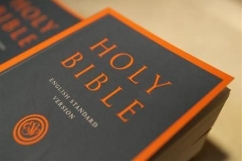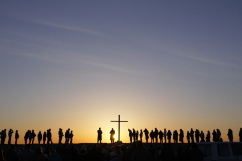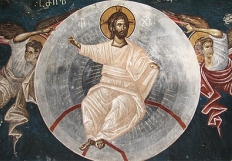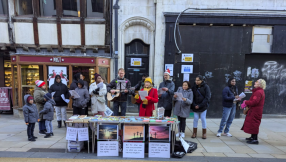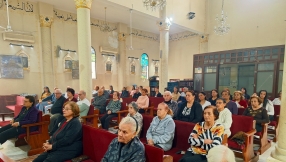"These that have turned the world upside down are come hither also" Acts 17:6
The life, teaching, death and resurrection of Jesus would have been useless to us unless we heard about it. Jesus ascending to heaven would just mean that he had gone. If, as looked highly likely, the early Church had been strangled at birth, then the past 2,000 years of Church history wouldn't have happened and Jesus would have been just another Palestinian peasant executed by the brutal Roman Empire. The survival and growth of the Christian Church over the past 2,000 years is itself miraculous. When Christ said "I will build my church and the gates of hell will not prevail against it", he meant it. And he has been proved true.
But now you get hit with one of the biggest objections: 'That's all very well, and maybe Jesus is OK – but look at the Church!'
The instinct of many Christians is to immediately say: 'Don't look at the Church'. But the trouble is, Jesus says the opposite. He says that people will see our good works and glorify our Father in heaven. He says that all men will know that we are his disciples because of our love. And most astonishingly, he says that our relationship with the Triune God is the ultimate evidence of the Son being sent (John 17:21). So the neat escape clause of 'Don't look at us, look at Jesus' doesn't work. The Church is one of the great evidences for Jesus.
Our non-Christian friends (and many of our Christian friends) when they think of the history of the Church will immediately play a word association game. Church = the Crusades, the burning of witches, the Inquisition. The cultural supremacy of the atheistic mind-set in the 20th Century has resulted in a re-writing of history so that the narrative is one in which the Church is associated with these host of negatives. It is a caricature, but like all caricatures there is an element of truth within it and therefore even Christians have fallen into the trap of distancing ourselves from the history of the Church. Doubtless you have heard the line: 'I like Jesus, but I don't like the Church'. This is often said by people who don't know either Jesus or the Church, but are just going by impression and feeling.
As a historian I love reading and thinking about history and would recommend strongly that you actually do read books and primary sources if possible, rather than just rely on Google and Wikipedia. In terms of reading I would like to recommend the excellent series by Nick Needham, 2,000 Years of Christ's Power and three superb books by Mike Reeves: The Breeze of the Centuries, The Unquenchable Flame and On Giants Shoulders. These are general popular introductions.
The early Church
The second part of Luke's two-part account of the early Church (his first being the Gospel of Luke) is known as the Acts of the Apostles. His introduction to that is fascinating: "In my former book, Theophilus, I wrote about all that Jesus began to do and to teach until the day he was taken up to heaven, after giving instructions through the Holy Spirit to the apostles he had chosen." (Acts 1:1-2) You will note that he speaks of what Jesus began to do and to teach – the implication being that his teaching and doing continued after he ascended into heaven. The book of Acts records how the early Church was birthed, developed and grown, spreading from Jerusalem on the day of Pentecost, to its ending with Paul's house arrest in Rome. It is a fascinating story of courage, persecution, miracles, new churches and incredible growth. From the very beginning, the Christian Church has always been a missionary Church.
The Epistle of Mathetes to Diognetus written less than 100 years after the death of Christ indicates one of the reasons why Christians had such an impact in the Roman Empire:
"The Christians are distinguished from other men, neither by country, nor language, nor the customs they observe. The course of conduct which they follow has not been devised by any speculation or deliberation of inquisitive men; nor do they, like some, proclaim themselves the advocates of any merely human doctrines. But, inhabiting Greek as well as Barbarian cities, according as the lot of each of them has determined, and following the customs of the nations in respect to clothing, food, and the rest of their ordinary conduct, they display to us their wonderful and confessedly striking method of life...They marry as do all; they beget children, but they do not destroy their offspring. They have a common table but not a common bed. They are in the flesh, but they do not live after the flesh. They pass their days on earth, but they are citizens of heaven."(The Anti-Nicene Fathers, Vol 1)
A pagan writer, Lucian of Samosta, in AD 170 gave his reasons for the growth of Christianity: "The Christians you know, worship a man to this day – the distinguished personage who introduced their novel rites, and was crucified on that account... You see, these misguided creatures start with the general conviction that they are immortal for all time, which explains their contempt of death and their voluntary self-devotion which are so common among them; and then it was impressed on them by their original lawgiver that they are all brothers, from the moment they are converted, and deny the gods of Greece, and worship the crucified sage, and live after his laws." Apart from the fact that Christians were prepared to die for their faith (note that they were not prepared to kill for their faith), this testimony reminds me of the words of Christ: 'all men will know you are my disciples if you have love one for another".
What is the Church?
Augustine said that he who does not have the Church for his mother cannot have God for his father. Which leads us to ask – what is the Church? It is the ecclesia. The called out assembly of the people of God. There are different understandings of just exactly how a church should be governed, and there are different understandings of secondary doctrines in terms of theology and doctrine, but I would argue that the Church of Jesus Christ is one through all the ages and is, as Christ himself taught, his bride. I realise it can get very confusing with all the different denominations and claims and counter-claims. For me, I don't really have that much difficulty. God has preserved and kept his Church in many different forms and will continue to do so. In fact, it could be argued that the very flexibility of the Church and its ability to adapt to different cultures is one of the reasons it has continued to grow.
The key element, though, has to be that the Church is the Church of Jesus Christ. He founds it, he is the cornerstone, and when she moves away from Christ she stops being the Church. Calvin summarised it well: "I am only saying that the blessed and happy state of the Church always had its foundation in the person of Christ."
There is a basic simple point here: Christ is the foundation of the Church. Not nationality. Not class. Not priests, kings or queens. He is the foundation and the head. How much trouble would have been avoided if those that call themselves Christians and Churches had remembered and practiced this! Calvin also said: "In the church are mingled many hypocrites who have nothing of Christ but the name and outward appearance." Our atheist friends are very clever here – they mix and match two doctrines. Firstly, they agree with Jesus' teaching about hypocrisy being one of the worst sins and gleefully point out the hypocrisies of many who claim the name of Christ. Then they put their own hypocritical doctrine of equality into the equation (hypocritical because they exclude themselves), and declare that it would not be right to condemn just one particular person or group – so lets condemn them all! If one Christian does something wrong, then all Christians are to be blamed. If one church gets something wrong then all are tainted. Guilt by association. If we point out that this is a shallow and superficial view and does not take into account either the Bible's own teaching that all people including Christians are sinners and therefore of course Christians are going to do things that are wrong; nor the obvious observation that not every group that professes to be a church is a church, they protest 'but who are you to judge?'. And thus in the name of being non-judgemental, they judge us all.
Of course there are going to be hypocrites and false churches but just because there is the false it does not exclude the real. Counterfeit banknotes only exist because real ones do. Counterfeit Christianity only exists because there is real Christianity. Sadly of course throughout history and still today there have been those who shame the name of Christ, by living lifes contrary to the faith they profess. This is even worse when it is church leaders who do so. Forgive me for citing Calvin again – "How often did Christ and his apostles foretell that pastors would pose the greatest dangers to the church?"
Did Christianity spread by violence?
There is no doubt that once the Apostle Paul was told to go west to Greece, rather than east to Asia, European and world history was changed. The world was turned upside down (Acts 17). When the Emperor Constantine was converted to Christianity in 312, it marked the transformation of the Church from being a persecuted and much maligned minority to eventually becoming the official religion of the Roman Empire. We can argue about how much that was a good or bad thing, but from that point on for many European countries and for most of subsequent European history, Church and State were intertwined. This means that we run into a problem when we consider the whole question of whether the Church used violence. So, for example, were the Crusades primarily religious, political or economic? Did the Church burn witches, or was it councils and governments? We really need to find out the facts as well as the context of what is involved.
Many people seem to have the idea that the Church burnt or drowned millions of witches and that the Inquisition was responsible for death of hundreds of thousands more. But the nearest figures we have are that perhaps 40,000 women were killed as witches over a period of two hundred years – that is 200 per year over the whole of Europe. It is of course 200 too many, but still a different story to that which is often portrayed. As for the Inquisition, the last figures I saw suggested that there were 6,000 deaths over 500 years. That is horrendous and I would not attempt to justify or excuse it in the name of Christ, but again it is not quite the story that we are led to believe.
The trouble is that once the Church had political power, it became necessary if you wanted political power to belong to the Church. Then of course it becomes very difficult to distinguish between those who belong to the Church because they follow Jesus and those who belong to the Church because they want the power. And we must admit there are those who do have a false theology (i.e. Jesus wants us to burn heretics) who in their religious zeal cause a great deal of harm. Zeal without knowledge and love is always dangerous, but perhaps especially so when it is linked with religion. As Pope Benedict said: "The temptation to use power to secure the faith has risen again and again in varied forms throughout the centuries, and again faith has risked being suffocated in the embrace of power."
Please don't equate everything that is done in the name of Christ with Christ. But then some will ask: 'Is that not having it both ways?' When we see some of the good coming from Christianity we claim it, but when we see the bad, we disclaim it. Can I suggest that it is a little more nuanced than that? I accept fully that Christians and Churches, including me and mine, will do things that are wrong and even evil. I accept that because I see it, and also because I believe what Jesus says about the pervasiveness of human sinfulness. However I also accept that though we are still sinners, it is possible to know them by their fruits. Any work of God in a human being will demonstrate something of the fruit of the Spirit, and any church of Christ, will show something of the beauty of Christ – in the midst of all the sin and ugliness.
The Christian way is not about power but about the way of the cross – and every generation needs to learn that.
David Robertson is the moderator of the Free Church of Scotland and director of Solas CPC, Dundee.










